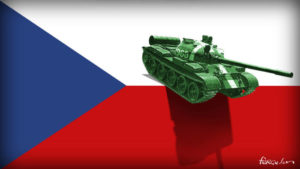Fifty years on, there are still lessons to be learnt from the Prague Spring, the FT’s Tony Barber writes:
 The first is that doctrinaire ideologies and political practices, whether they be 1960s-style communism or the intolerant dogmas of today’s radical right and left, contain the seeds of their own downfall. They propose inadequate solutions to the complex problems of modern societies. They bully critics, deride experts and degrade reason. In so doing, they generate economic inefficiency, social tension and political discontent.
The first is that doctrinaire ideologies and political practices, whether they be 1960s-style communism or the intolerant dogmas of today’s radical right and left, contain the seeds of their own downfall. They propose inadequate solutions to the complex problems of modern societies. They bully critics, deride experts and degrade reason. In so doing, they generate economic inefficiency, social tension and political discontent.- The second lesson is that the human thirst for political rights, justice and national freedom is unquenchable. This was on display throughout the communist era: East Berlin in 1953, Budapest in 1956, Prague in 1968, Gdansk in 1980 and across the Baltic states in 1988-91. The patriotism of Czechs and Slovaks is more civic than nationalist in nature. But the recovery of independence is one of their most cherished gains of 1989.
-

Credit: FT
The third lesson is that political struggle need not be conducted, as in much of today’s world, in the language of the gutter and with the manners of the yahoo. In 1968, Dubcek wore a permanent smile on his face and celebrated the dignity of the individual. He can be faulted for a naive faith that communism was reformable. But he had the last laugh when he returned to a hero’s welcome on Wenceslas Square after the triumph of the 1989 Velvet Revolution.
When Soviet tanks rolled into Czechoslovakia 50 years ago, crushing the period of liberalization known as the Prague Spring, a young photographer named Libor Hajsky captured scenes of violence and fear — as well as moments of empathy and dark humor, RFE/RL adds.
 During the Cold War, Czechoslovak Documentation Center, “one of the most important exile institutions of the second half of the 20th century,” was a vital link between dissidents in Czechoslovakia and the outside world, notes Rodger Potocki, NED’s Senior Director (Europe):
During the Cold War, Czechoslovak Documentation Center, “one of the most important exile institutions of the second half of the 20th century,” was a vital link between dissidents in Czechoslovakia and the outside world, notes Rodger Potocki, NED’s Senior Director (Europe):
The Center, a valuable archive of the samizdat (“self-published,” or underground) and other writings of Charter 77 dissidents and other Czech and Slovak  democrats, was the dream of Vilém Precan (right, with Vaclav Havel), a historian who was dismissed from his job at the Academy of Sciences and forced to emigrate after publishing the famous “Black Book,” which documented the brutal Soviet invasion of Czechoslovakia that ended the 1968 Prague Spring.
democrats, was the dream of Vilém Precan (right, with Vaclav Havel), a historian who was dismissed from his job at the Academy of Sciences and forced to emigrate after publishing the famous “Black Book,” which documented the brutal Soviet invasion of Czechoslovakia that ended the 1968 Prague Spring.
The above three lessons still matter “because of the remaking of the west’s political landscape over the past decade,” Barber adds.
“Liberalism is in retreat, the rule of law is under threat and national populism is on the rise. Transatlantic discord undermines Nato,” he adds. “The EU is short of unity, political willpower and good ideas. In some capitals, the reins of power rest in the hands of secretive, manipulative strongmen or abusive, vainglorious demagogues.”







